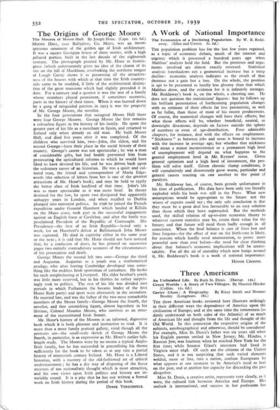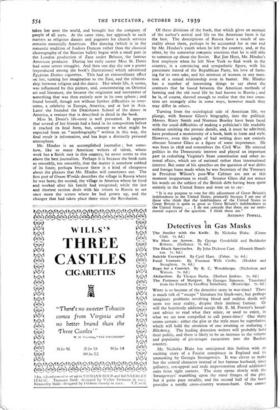Three Americans
THE three American books reviewed here illustrate strikingly in their different ways the dependence of America upon the civilisation of Europe; and at the same time the remoteness (so dimly understood on both sides of the Atlantic) of so much of American life and thought from the life and thought of the Old World. In this connexion the respective origins of the subjects, autobiographical and otherwise, should be considered. For example, Miss St. Denis's father was six years old when his English parents settled in New Jersey; Mr. Hindus, a Russian Jew, was fourteen when he reached New York for the first time; while Senator Glass's ancestors had lived in Virginia since 1648. Of such are the citizens of the United States, and it is not surprising that such varied elements welded, more or less, into a nation, confuse Europeans by what appears at one moment to be America's need to lean on the past, and at another her capacity for discarding the past altogether.
Miss St. Denis, a creative artist, represents very dearly, as it were, the cultural link between America and Europe. Her outlook is international, and success in her profession has
taken her over the world, and brought her the company of people of all sorts. At the same time, her approach to such matters as religious dances and pageants for church services remains essentially American. Her dancing (which is in the romantic tradition of Isadora Duncan rather than the classical choreography of the Russian ballet) began with a small part in the London production of Zaza under Belasco, the famous American producer. During her early career Miss St. Denis had some severe struggles. And then one day she saw a poster (reproduced among the book's illustrations) which advertised Egyptian Deities cigarettes. This had an extraordinary effect on her, turning her imagination to the East, and the relation- ship between religion and the dance. Her whole life, it seems, was influenced by this picture, and, concentrating on Oriental art and literature, she became the originator and interpreter of something that was then entirely new in its own sphere ; and found herself, though not without further difficulties to over- come, a celebrity in Europe, America, and at last in Asia. Later she founded the Denishawn School of the dance in America, a venture that is described in detail in the book.
Miss St. Denis's life-story is well presented. It appears that several of her friends had a hand in its composition before it reached its final form, but, contrary to what might be expected from an " autobiography " written in this way, the final result is informative, and has kept a distinctly personal atmosphere.
Mr. Hindus is an accomplished journalist ; but some- how, like so many American writers of talent, whose work has a finish rare in this country, he never seems to rise above the best journalism. Perhaps it is because the book runs so smoothly, too smoothly, that the matter is somehow robbed of its force; perhaps because there is a kind of cheapness about the phrases that Mr. Hindus will sometimes use. The first part of Green Worlds describes the village in Russia where he was born; the second, the village in America where he lived and worked after his family had emigrated; while the last and shortest section deals with his return to Russia to see once more the scenes where he had grown up, and the changes that had taken place there since the Revolution.
Of these divisions of the book, that which gives an account of the author's arrival and life on the American farm is far the best. The descriptions of Russia have a touch of un- reality about them, perhaps to be accounted for at one end by Mr. Hindus's youth when he left the country, and, at the other, by the somewhat romantic emotions that he is still able to summon up about the Soviet. But Jim Hoyt, Mr. Hindus's first employer when he left New York to find work in the country, is a convincing and sympathetic figure, with his passionate hatred of the Republican Party, his love of farm- ing for its own sake, and his mistrust of women or any men- tion of a sexual relationship even in banter. Mr. Hindus has a number of interesting things to say about the contrasts that he found between the American methods of farming and the old rural life he had known in Russia ; and he is, of course, shrewd enough to realise that the two coun- tries are strangely alike in some ways, however much they may differ in others.
Turning from the sociological side of American life, we plunge, with Senator Glass's biography, into the political. Messrs. Rixey Smith and Norman Beasley have been faced with the usual difficulties of making a politician's life readable without omitting the prosaic details, and, it must be admitted, have produced a monstrosity of a book, both in form and style. However, even this jungle of bad writing does not entirely obscure Senator Glass as a figure of some importance. He was born in 1858 and remembers the Civil War. He entered politics in the Democratic interest and played an important part in redrafting Virginia's State constitution and other in- ternal affairs, which are of national rather than international interest. But some of his speeches on the question of war debts and foreign loans made when he was Secretary of the Treasury in President Wilson's post-War Cabinet are not at this moment inopportune to recall. Senator Glass did not mince his words on the subject of the British debt having been spent
entirely in the United States and went on to say: "It is my purpose to vote for this adjustment of Great Britain's indebtedness to the United States, primarily because I am one of those who think that the indebtedness of the United States to Great Britain is quite as great as Great Britain's indebtedness to the United States. . . . I do not concede that there are no senti- mental aspects of the question. I think there are."
ANTHONY POWELL.













































 Previous page
Previous page